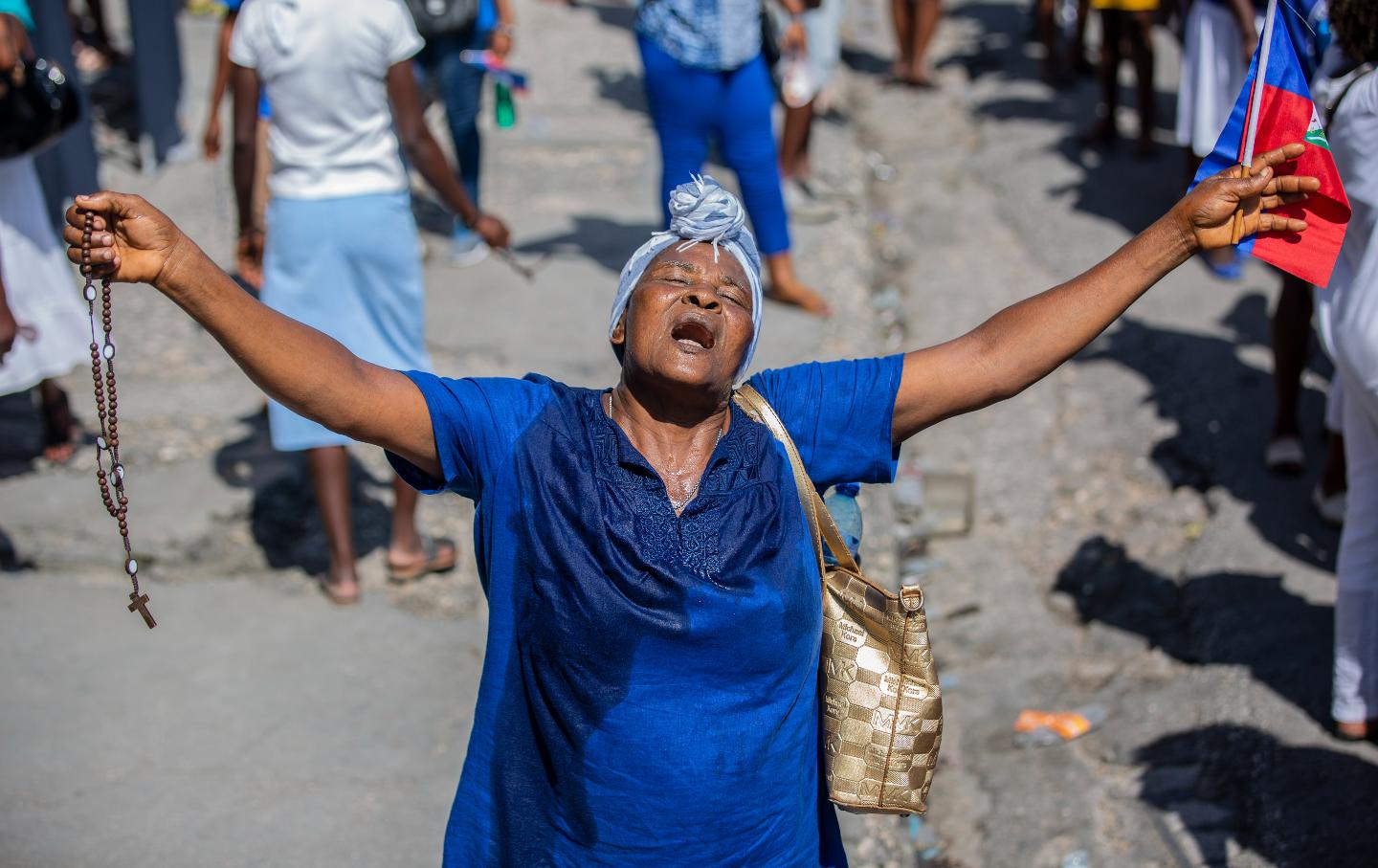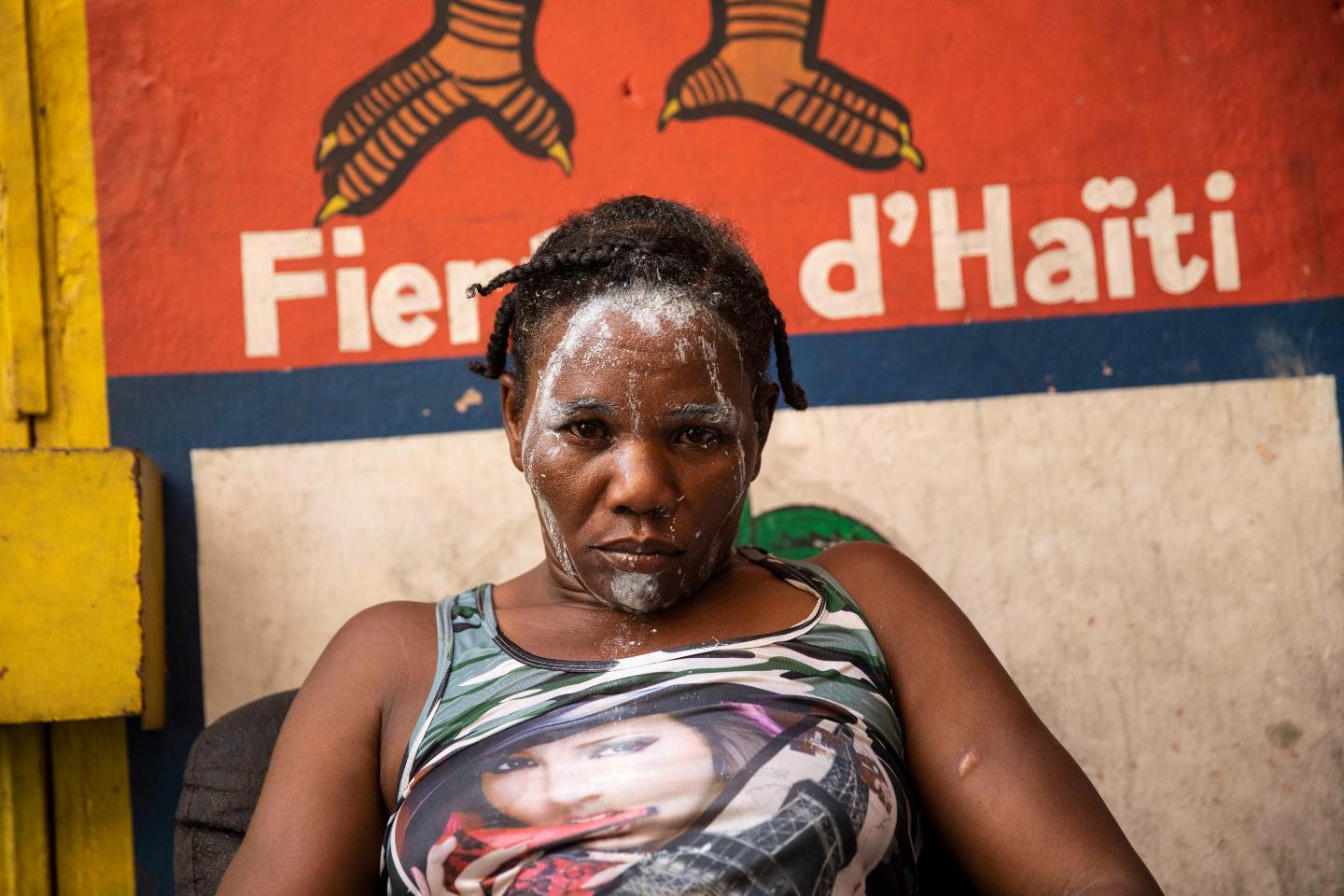Let’s take a harder look at the kidnapping in Haiti that’s making the news this week. Sixteen Americans, including several children, plus one Canadian, all part of Christian Aid Ministries, were taken on October 16 by one of Haiti’s largest gangs, 400 Mawozo, as the foreign group was finishing a visit to an orphanage.
Every week in Haiti, there are many kidnappings—enlèvements not just of nurses or teachers or pediatricians but average people as well. In addition, every month or so, there’s a cold-blooded assassination of a do-gooder or a rights activist or a journalist or doctor or lawyer. There have been several massacres during the past 10 years, mostly in “opposition” neighborhoods, including one in which more than 70 people were killed.
But up until now, almost all those victims have been Haitian, or Haitian-American (a few), and perhaps because the decade’s two Haitian presidents, who should have been dealing with these things, served at the pleasure of the State Department, neither the American government nor the US media has taken much notice of the ills that occurred under these regimes. What happens in Haiti stays in Haiti, if possible. There, for the Americans, Black lives don’t matter.
What reader or listener to mainstream American media, for example, has heard the names of Monferrier Dorval or Antoinette Duclaire or Diego Charles?
And yet Dorval was a respected lawyer, a constitutional scholar, and the head of Haiti’s bar association. Duclaire was one of Haiti’s best-known and most vocal human rights advocates, and Diego Charles was a radio and website investigative journalist and critic of the government who worked with Duclaire. Each of them was assassinated in cold blood.
Who cares? Not the US government—and not the American media.
I have written this piece before. Just a day before Haitian president Jovenel Moïse was killed, I wrote about how the Americans were, seemingly willfully, ignoring the destruction of Haiti’s middle class, its intelligentsia, its patriots, and its population in general. In the first nine months of 2021, at least 628 documented kidnappings took place, almost all unreported by US media (except, notably, the Miami Herald) and overlooked by the State Department. This was par for the course for the US government, but surprising (a bit) from the media.
Then, in the early morning hours of July 7, Moïse was assassinated—a leader who had presided, with unstinting American backing, over much of this violence, and who had deliberately destroyed the major branches of Haitian democracy. He gloated as the legislature was decimated by attrition and he fired and jailed justices, only replacing a choice few with his own cronies. Mayors around the country were similarly replaced with Moïse people, and no elections of any kind were held during his almost five years in office. At the time of his death, there were only 10 legislators left in office.
Popular
"swipe left below to view more authors"Swipe →
The Haitian president’s murder actually got some attention here in the US… because Moïse was our man. In 2011, a year after a disastrous earthquake in Haiti that killed more than 200,000 people, Moïse’s predecessor and mentor, Michel Martelly, an earthy and well known compas singer and musician, was wrestled into the second round of an inconclusive election by then–US Secretary of State Hillary Clinton and her husband—at the time the UN’s special envoy. Martelly won that election, though fraud was alleged by most observers, including members of the Core Group of international “friends of Haiti,” organizational and national actors who have been interfering in Haitian affairs for years. Nonetheless, the US and the Core Group continued to support Martelly and then Moïse, in spite of the two politicians’ absolute neglect of their duties to the Haitian people, and also in spite of definitive proof of extreme corruption during their administrations. While all of this harm was being done to the Haitian state, Moïse agreed to have Haiti vote for an OAS resolution condemning the election of the Maduro government in Venezuela, which endeared him to Trump.
Under Obama, Trump, and now Biden, the State Department supported Martelly and then Moïse right until the moment when Moïse was shot to death in the master bedroom of the presidential mansion by still unknown and shadowy figures. Now, when it might have shifted gears, Washington continues to support Moïse even in death in the form of the man he named as his fifth prime minister in the days before he was killed, Ariel Henry, now de facto prime minister and leader of Haiti.
Kidnappings in Haiti have become so routine and unreported that Henry’s daughter-in-law was kidnapped recently, and subsequently released, without a mention in the US media.

Let’s not call them puppets, but you can’t avoid the fact that the US government has been unusually tolerant of the Martelly and Moïse regimes. Jean-Claude (Baby Doc) Duvalier arguably did less harm to Haiti—and yet the US greenlighted his departure in 1986, after several huge demonstrations against him and the killings of three students in an outlying town. Recent killings now far surpass what happened toward the end of Baby Doc’s time, and the demonstrations against the government have been bigger and more sustained—but the Americans remain unmoved.
Here are the ten American rules for being president of Haiti (maybe you’d like the job?):
1. Don’t interfere with Haitian business people who are old friends of the American Embassy, no matter what corruption they’re into: customs, ports, energy, protection, banking, drugs, etc. They are our old friends.
2. Understand that you may be president, but the business people actually run Haiti, as they wish—as we wish.
3. You too may steal and let your friends steal. You too may assassinate and let your friends assassinate. Massacre likewise. Please try to do it quietly, but, frankly, as long as you obey rule 1, we don’t care. We will never stop you. We don’t care if you have millions of dollars from unknown sources stowed away in cash in your house, as Moïse reportedly did when he was killed.
4. If you need gangs to run the country because you’ve destroyed all democratic institutions and all law enforcement through attrition, firings, and corruption, OK. We don’t really care what they do (however, see rule 9).
5. Do not worry about the Haitian people. They are long-suffering, philosophical, fatalistic. They are proud and uncomplaining and they know how to make a buck a day in a failed economy. They can put up with your neglect. If they die of Covid because you failed to provide vaccinations… don’t worry. They won’t starve—and if they do… we don’t care.
6. But don’t let them leave the country. We’ll help you stop them. If you let them leave, we will send them back.
7. Never think that just because you’re the president of Haiti, we respect you or will protect you. We don’t, and we won’t—but do what we say or you’re out. You are not independent. You are not the leader of a sovereign nation. Don’t kid yourself.
8. Remember: Only some Black lives matter. Black American lives.
9. Thus: Never let the gangs kidnap white Americans. Never.
10. Never admit that these are our rules for you.
But now there’s a problem. Rule number 9 has been violated—boldly and, of course, publicly. Reportedly, $17 million has been demanded as ransom for the American and Canadian hostages.

The latest kidnapping is the first time a large group of Americans has been kidnapped at once. There have been a very few kidnappings before of white foreigners, but nothing as daring and large as this one.
Here’s what Haitian filmmaker Raoul Peck, director of I Am Not Your Negro and of Lumumba, has to say about the latest kidnapping: “We’ve been losing people—women, men, and even children, workers, market women, school children, journalists, and pastors every day, kidnaped, tortured, raped, and sometimes murdered. We’re a population forced to live in fear, day and night. Thousands of Haitians have had to flee their neighborhoods because of ongoing gang violence. It’s not a new situation for the Haitian people, who have to fight at the same time the stubbornness of the American Embassy in Haiti and the UN Bureau in Haiti, as well as an incompetent and illegal government installed by the US. Because of the kidnapping of the American missionaries, this situation is suddenly visible to the wider American public, but it has been like this for us on a daily basis for the last three years. The current invisible prime minister has done nothing much about this situation.”

Both the assassination of Moïse and the kidnapping of the US missionaries (and one Canadian!) are a kind of blowback, blowback that has exposed our deplorable and failed policy in Haiti. The recent resignation of Biden’s special envoy to Haiti, veteran diplomat Daniel Foote, had already shed the light of truth on our immoral policies there, in particular the recent deportations of hundreds of the Haitian migrants at Del Rio on the Texas border.
Meanwhile, the gangs have expanded their control of the country and the political dance goes on.
So who’s really in charge in Haiti? Certainly not Ariel Henry, who can’t even manage to prosecute the killers of his mentor. Last week Henry tried to lay a wreath at Pont Rouge, at the annual memorial to Jean-Jacques Dessalines, one of the founders of the Haitian state and a committed fighter and leader during the Haitian revolution of 1791–1804.
Every year on October 17, the anniversary of Dessalines’s assassination by rivals, the Haitian president lays such a wreath. But this year, when Henry arrived with his bundle of leaves and flowers, G9, one of the biggest gangs of the capital region, scared him away by firing their guns at or around his caravan. He left in a hurry. Police at the scene watched the events with arms folded. According to human rights advocate Pierre Esperance, Henry arranged a $200,000 payoff to the gang to allow the event to proceed smoothly. The money was delivered, Esperance alleges, and still the gang blocked his way (Henry has publicly denied these charges). Again according to Esperance, the police refused to help because… the government hasn’t been paying them the high-risk premiums they are owed.
After his gang chased the de facto prime minister away, G9’s notorious and outspoken leader, Jimmy (aka Barbecue) Cherizier, officiated at the ceremony in white suit and tie, taking on fully the presidential role that, for more than a year, he has seemingly been preparing to assume. This is a man who wears Castro-like fatigues or drapes himself in the Haitian flag—literally—while giving frequent press conferences to the Haitian media and any international media he can find, claiming in fiery revolutionary language to represent the Haitian people. There are many allegations about his involvement in some of the worst of the violence of recent years, including the worst of the massacres. If Cherizier is not targeted for assassination amid the chaos enveloping the country, he may one day—perhaps not too far distant—actually fulfill the destiny he so clearly sees for himself.
Stoically, in the midst of all this, the only grown-ups in the room soldier on. The Commission for a Haitian Solution, a large and respected umbrella group of organizations from Haitian civil society, has proposed a step-by-step route out of the current political crisis. They began their work on what is now known as the Montana accord (after the Montana Hotel, where it was fashioned) months before Moïse’s assassination, and have persisted in the face of threats, meddling, and disruption. Among them are students, labor, shantytown organizers, human rights groups, educators, crafts workers, women’s groups, political parties, and progressive private sector figures. They have talked to everyone across the political spectrum and spent many long, painful hours and days hammering out a political accord that maps a path toward an interim government that would work with forces of order to rein in and pacify the gangs and reintegrate them into a revitalized economy. The group’s elected leadership is working toward national elections in which voters, released from daily terror in the streets, might actually feel able to participate. Instead of the headlong rush to the kind of show elections the US has backed with Martelly, Moïse—and now Henry.
But those who wish to continue the status quo in Haiti—including the US State Department and the UN bureau in Haiti—continue to prop up Ariel Henry’s new, jury-rigged coalition, which was put together only when Henry and the State Department realized that they needed to present a “popular” alternative to the work of the commission. The long arm of the embassy seemed very present in the quickly drawn up and signed accord presented by Henry, who had just been charged by the presiding prosecutor with involvement in Moïse’s assassination. (Henry quickly fired the prosecutor.)
Then Special Envoy Foote resigned, and in his resignation letter made an explicit attack on US policy in Haiti. Suddenly, the State Department had to deal with a truth-teller in their own midst. In Haiti, it seemed like a big deal: an American diplomat attacking American policy in a country on the verge of chaos. But in the United States, barely anyone noticed except the Haiti Caucus in Congress and the Haitian diaspora community. Yet there was a crisis.
The latest kidnappings represent a real challenge to the weak and feckless rule of Ariel Henry. Who will rule Haiti in the run-up to a new set of elections? Will it be Henry, after all, with US support? Or the commission with the broad-based Montana accord? Or someone like Cherizier, who doesn’t exactly seem like a man dedicated to democratic elections?
With the future of the country at stake, 400 Mawozo kidnapped 16 American citizens not of Haitian origins. (By which I mean white, although some of them may be nonwhite.) Now why would a gang do that?
Possibly Mawozo, which has kidnapped large groups of people before, simply stumbled upon the missionaries and decided they were a high-value target. This seems unlikely, since it’s the very first time a group of Americans has been taken like this. There are many bands of American missionaries and aid workers and even occasionally reporters in Haiti, still today, riding around in buses and SUVs. No group like this has been taken until now.
Most reliable resources say Mawozo is a criminal band without political goals. Yet perhaps the moment seemed ripe to use these hostages as a means to push the Biden administration’s Haiti policy one way or another. That the hostages are a Christian group might just be icing on the cake, since if Biden can’t protect such a group, that could provide fodder for his domestic political opponents.
Only a few days before the missionaries were taken, the United States had sent in senior officials to assess the security situation in Haiti. The UN had just threatened the heads of Haiti’s gangs with arrest (very late in the game). In this scenario, the kidnapping could be seen as a gauntlet thrown down in the face of the outside groups that control Haiti’s nominal government—especially the US. One question is whether Biden might be tempted to use the kidnapping as an excuse for a limited military intervention in an unstable Haiti, or whether an agreement to free the hostages might determine the fate of Ariel Henry’s rule.
As an immediate response, in any case, Washington has just flown in a plane full of FBI officers to work with the Haitian government on hostage negotiations and other matters related to the kidnapping. In order to judge how well that plan will work, it’s useful to recall that the last FBI team sent to Haiti was supposed to figure out who killed Jovenel Moïse.
Nearly four months later, they’ve made no progress worth reporting.


